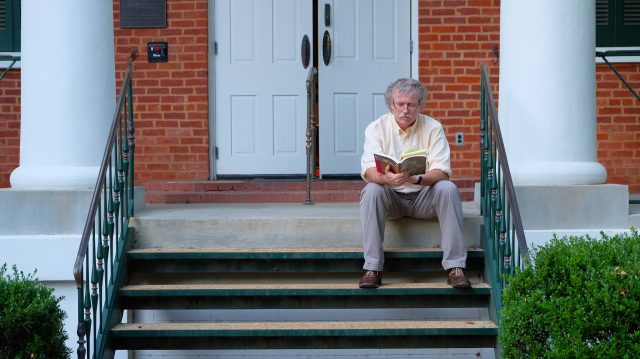 OXFORD, Miss. – After Ted Ownby stepped down as the director of the Center for the Study of Southern Culture at the University of Mississippi in 2019, he wanted to do something different, so he decided to apply for a Fulbright Award.
OXFORD, Miss. – After Ted Ownby stepped down as the director of the Center for the Study of Southern Culture at the University of Mississippi in 2019, he wanted to do something different, so he decided to apply for a Fulbright Award.
To his delight, he received word that he will be the Danish Distinguished Chair in American Studies at the University of Southern Denmark, which combines research and teaching and is the most prestigious Fulbright grant in Denmark.
Ownby, the UM William Winter Professor of History and professor of Southern studies, made his decision after attending the Southern Studies Forum in Denmark last year.
“The Center for American Studies at the University of Southern Denmark is a lively group with several scholars interested in the American South, and the university is an attractive place; I remember walking trails, bicycles and lots of birds,” Ownby said.
“The city of Odense is Denmark’s third-largest city, famous among other things as the home of Hans Christian Andersen, and I look forward to getting to know it. I’ll teach in English, but I’m slowly and awkwardly learning some Danish.”
He will teach one class to either graduate or upper-level undergraduates with class sizes of approximately 25-45 students. He also will give at least one public lecture at the University of Southern Denmark, attend faculty meetings, talk to faculty and students, and be available to travel to other European universities.
Katie McKee, director of the Center for the Study of Southern Culture, has been a colleague of Ownby for many years.
“This Fulbright is a tremendous opportunity for Dr. Ownby, a well-deserved chance for adventure after many years of serving as center director and a real testament to the excellence of his scholarship,” McKee said.
The award was intended for the 2020-21 academic year, but the COVID-19 pandemic shortened the stay to the spring semester only, which begins in January 2021. Coincidentally, robotics researchers at the University of Southern Denmark have developed the world’s first fully automatic robot capable of carrying out throat swabs for COVID-19, so that healthcare professionals are not exposed to the risk of infection.
“I proposed two classes when I thought I would be there for two semesters: one on my current book project on ideas about innocence in 20th-century Mississippi and the other a broader class on recent scholarship in Southern history,” Ownby said.
“Now the plan is either to teach the class about Mississippi, or maybe to team teach with a couple of colleagues in Denmark. Of course, it’s hard to plan right now, because it’s possible that health conditions won’t allow international travel.”
January should be an especially intriguing time to be teaching about the U.S. because classes will begin just a few days after the presidential inauguration.
“That election, no matter what I’m teaching about, will likely be a starting point for some good discussions,” Ownby said. “More broadly, teaching U.S. history outside the U.S. is always useful – I saw this teaching in the Fulbright program in Italy almost 30 years ago – because it makes faculty think about the questions we start with and encourages us to think about making comparisons we might not have considered.”
Colleagues in the history department are especially thrilled with Ownby’s award, said Noell Wilson, chair of history and Croft Associate Professor of History and International Studies.
“It reveals the global profile of our faculty, even those who work primarily on U.S. history and not necessarily (on) international topics,” Wilson said. “We are constantly looking to build intellectual bridges with colleagues in Europe and beyond and are grateful to Ted for sharing his expertise with scholars and students in Denmark to establish collaborations in Scandinavia.”
Both the Danish and U.S. governments financially support this program. The Fulbright U.S. Scholar Program offers approximately some 470 teaching, research or combination teaching/research awards in more than 125 countries.
Opportunities are available for college and university faculty and administrators as well as for professionals, artists, journalists, scientists, lawyers, independent scholars and many others. Besides several new program models designed to meet the changing needs of U.S. academics and professionals, Fulbright offers flexible awards including multicountry opportunities.

